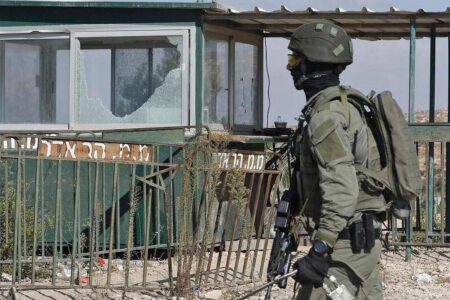
Supreme court upholds conviction of teen accomplice in deadly Jewish terrorist attack
The Supreme Court on Thursday upheld the charges against a convicted accomplice in the deadly 2015 arson attack that killed three members of the Dawabsha family in the West Bank village of Duma.
The man has not been named due to the fact that he was a minor at the time of the firebomb attack, in which three members of the Dawabsha family, including an 18-month-old, were killed.
Lawyers for the man had appealed on the grounds that they believed that the court had “been harsh with the minor” and claimed the conviction was based on information obtained through torture. In June 2018, the Lod District Court rejected some of his confessions after it was revealed that they had been provided under duress during Shin Bet interrogations.
Attorneys also argued that a case had not been made that the man had been a member of a terror organization.
“The patterns of activity of the appellant and his friends are the same as those of other terrorist organizations, which seek to promote a new political and social order in accordance with their worldview, while committing acts of violence against the public,” Justice Yosef Elron said in his ruling. “Membership in these groups and organizations requires a deterrent and tangible punishment.”
Elron also acknowledged issues with the manner in which the interrogations had been carried out, but ruled that the failings were not enough to dismiss the conviction.
Honenu, a legal aid group that often represents Jewish terror convicts and far-right settlers, slammed the court’s decision, saying in a statement that it was “detached from the legal questions raised in the hearing.”
The man reached a plea agreement in 2019 with the State Attorney’s Office in which he admitted to having planned the torching of the Dawabsha home, but murder charges were dropped. The Lod District Court later ruled that he was a member of a terror organization, tacking the additional charge onto his rap sheet.
In return for the admission of guilt in planning the attack, the man received a relatively light sentence — he has been in the Ma’asiyahu Prison since last December, where he will spend ten months behind bars. The rest of his three-and-a-half-year sentence was considered time served mostly under house arrest during the legal proceedings.
The then-minor was convicted for his involvement in the Duma firebombing, membership in a Jewish terror group, as well as several other so-called price tag revenge attacks against Palestinians.
As part of the plea bargain, the man admitted to having carried out three other hate crimes targeting Palestinians: torching a garage next to a residence in the northern West Bank Palestinian village of Aqraba, torching a taxi in the nearby town of Yasuf, and slashing car tires in the Palestinian neighborhood of Beit Safafa in East Jerusalem.
According to Israeli law, the maximum sentence for arson is 15 years in prison.
In September 2015, right-wing extremist Amiram Ben Uliel and the teenage accomplice planned to attack Palestinians in the West Bank village of Duma, apparently as revenge for a terror attack in which a settler was shot earlier that month. The two agreed to meet beforehand on the night of the attack. When the younger accomplice failed to show up on time to the rendezvous point, Ben-Uliel decided to carry out the attack on his own, according to the indictment.
Under cover of darkness, Ben Uliel lobbed homemade explosives into the home of the Dawabsha family. Parents Saad, Riham, and their 18-month-old son Ali perished. Only the couple’s eldest son, Ahmed, survived, with terrible burns; he was 5 years old at the time.
Source: TOI





